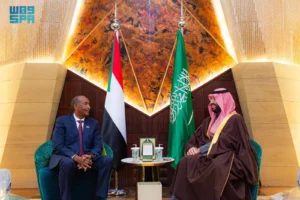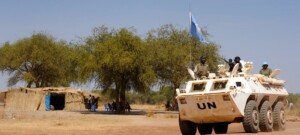Opposition forces: ‘Al Bashir must be tried both in Sudan and abroad’
The Sudanese Professionals Association has criticised Lt Gen Abdelfattah El Burhan, Chairman of the Sovereign Council, for his refusal to hand over ousted President Omar Al Bashir to the International Criminal Court. The Darfur Bar Association has called for the prosecution of local community leaders accused of committing “serious crimes” since war broke out in the region
 Newly displaced at Zamzam camp in North Darfur in March 2011 (Albert González Farran/Unamid)
Newly displaced at Zamzam camp in North Darfur in March 2011 (Albert González Farran/Unamid)
The Sudanese Professionals Association has criticised Lt Gen Abdelfattah El Burhan, Chairman of the Sovereign Council, for his refusal to hand over ousted President Omar Al Bashir to the International Criminal Court in The Hague. During a symposium in West Darfur, the Darfur Bar Association called for the prosecution of local community leaders accused of committing “serious crimes” since war broke out in the region.
In a press release on Sunday, the Sudanese Professionals Association (SPA) criticised the Chairman of the Sovereign Council for his statements last week about the trial of Al Bashir by the International Criminal Court (ICC).
El Burhan said in an interview with Al Jazeera Mubasher on Thursday that the current government does not intend to transfer Al Bashir to The Hague.
The SPA, the driving force behind the uprising that led to the fall of the Al Bashir regime in April and founding member of the Forces for Freedom and Change (FFC), called on the government to adhere to the principles of the uprising and respect the struggle of the Sudanese for justice.
The FFC also responded to the statements of El Burhan by saying that they adhere to their position to hand over Al Bashir to the ICC.
During a forum organised by the Akhbar El Yom newspaper on Saturday, FFC Spokesman Wajdi Salih pointed to a clause in the Constitutional Document, signed by the Transitional Military Council and the FCC in August, that stipulates “the implementation of justice in national and international courts concerning all perpetrators of crimes in Sudan”.
'No dictations from outside'
In end September, PM Abdallah Hamdok told the France 24 that “Al Bashir will be tried in Sudan, and we do not accept any dictations from outside”.
Chief Justice Nemat Abdallah told the British Ambassador to Sudan earlier this month that the decision about the extradition of Al Bashir and other former leaders to the Hague is the “prerogative of other authorities”.
Al Bashir was indicted by the ICC in 2009 for war crimes and crimes against humanity, and in 2010 for genocide. The court in The Hague also charged former Interior Minister Ahmed Haroun, former Defence Minister Abdelrahim Hussein, and janjaweed leader Ali Kushayb.
Al Bashir was deposed on April 11 and transferred to Kober Prison in Khartoum North, where he is currently being held on charges for corruption and illicitly acquiring wealth, and for murder. The two former ministers have been arrested as well.

'For the sake of the victims'
According to the Darfur Bar Association (DBA), the indictment of Al Bashir by the ICC does not mean he cannot be tried in Sudanese courts for other crimes.
On Saturday, members of the DBA stated that the purpose of handing over Al Bashir and other Sudanese officials to The Hague is not vengeance, but rather “to consolidate justice in society, and achieve punitive deterrence that prevents rulers from tampering with human blood”.
During a symposium in El Geneina, capital of West Darfur, organised by West Darfur resistance committees, DBA lawyers pointed to serious crimes committed by Darfuri community leaders, such as mass executions in Wadi Salih in Central Darfur in 2003-2004, who found protection from Al Bashir.
They stressed that not only Al Bashir and his aides, but also a number of Darfuris, regardless of their regional or tribal affiliation, are to be held responsible for committing crimes in the region.
This is not only needed to ensure the Rule of Law, and but also to achieve justice for the sake of the victims, they said.
Transitional justice
According to Brianne McGonigle Leyh, Associate Professor at the Netherlands Institute of Human Rights, victim participation must be the crucial focus of transitional justice in Sudan.
She said in an interview with Radio Dabanga last week that transitional justice processes focus primarily on victims – which differentiates transitional justice from other, larger processes such as restoring the Rule of Law, and development programmes.
Radio Dabanga’s editorial independence means that we can continue to provide factual updates about political developments to Sudanese and international actors, educate people about how to avoid outbreaks of infectious diseases, and provide a window to the world for those in all corners of Sudan. Support Radio Dabanga for as little as €2.50, the equivalent of a cup of coffee.












 and then
and then